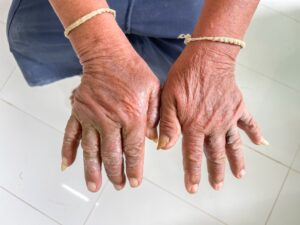May 22nd marks Gout Awareness Day, a day dedicated to raising awareness about this painful and often misunderstood form of arthritis. Gout affects millions of people worldwide, yet many remain unaware of its causes, symptoms, and impact on daily life. At Pacific Arthritis, we’re committed to shedding light on this debilitating condition and providing support and resources to those affected by it. In this blog, we’ll explore what gout is, common treatments, and how our expert rheumatologists can help patients find long-term relief.
Understanding Gout
Gout is a type of inflammatory arthritis caused by the buildup of uric acid crystals in the joints, leading to sudden and severe attacks of pain, swelling, redness, and tenderness. These attacks most commonly affect the joint at the base of the big toe but can also occur in other joints such as the ankles, knees, wrists, and elbows. Gout is often characterized by periods of flare-ups followed by periods of remission, during which symptoms may subside.
The primary risk factor for gout is elevated levels of uric acid in the blood, a condition known as hyperuricemia. Uric acid is a waste product that forms when the body breaks down purines, substances found in certain foods and beverages. When uric acid levels become too high, crystals can form and accumulate in the joints, triggering gout attacks.
Treatments for Gout
While there is no cure for gout, various treatments can help manage symptoms, reduce the frequency of flare-ups, and prevent long-term joint damage. Common treatments for gout include:
1. Medications:
Nonsteroidal anti-inflammatory drugs (NSAIDs), colchicine, and corticosteroids are often prescribed to relieve pain and inflammation during gout attacks. Additionally, medications such as allopurinol and febuxostat may be prescribed to lower uric acid levels in the blood and prevent future flare-ups.
2. Lifestyle Modifications:
Making changes to your diet and lifestyle can help reduce the risk of gout attacks and improve overall joint health. This may include avoiding purine-rich foods such as red meat, organ meats, shellfish, and alcohol, staying hydrated, maintaining a healthy weight, and getting regular exercise.
3. Joint Aspiration:
In cases of severe pain and inflammation, joint aspiration may be performed to remove excess fluid and urate crystals from the affected joint, providing immediate relief.
4. Long-Term Management:
Long-term management of gout involves ongoing monitoring of uric acid levels, medication adherence, and lifestyle modifications to prevent flare-ups and minimize the risk of complications such as joint damage and kidney stones.
How Pacific Arthritis Can Help
At Pacific Arthritis, our team of expert rheumatologists specializes in the diagnosis and management of gout. We understand the challenges of living with this painful condition and are dedicated to providing comprehensive care and support to our patients. Here’s how we can help:
1. Accurate Diagnosis:
Gout can sometimes be misdiagnosed or overlooked, leading to delays in treatment and unnecessary suffering. Our rheumatologists are skilled in accurately diagnosing gout through a combination of medical history, physical examination, and laboratory tests, including blood tests and joint fluid analysis.
2. Personalized Treatment Plans:
We understand that each patient’s experience with gout is unique, and treatment should be tailored to their individual needs. Our rheumatologists work closely with patients to develop personalized treatment plans that address their specific symptoms, lifestyle factors, and treatment goals.
3. Medication Management:
Our rheumatologists are knowledgeable about the latest medications and treatment options for gout. We carefully evaluate each patient’s condition and may prescribe medications to relieve pain and inflammation, lower uric acid levels, and prevent future flare-ups.
4. Lifestyle Recommendations:
In addition to medication management, we provide guidance on lifestyle modifications that can help manage gout symptoms and improve overall joint health. This may include dietary changes, weight management, hydration, and exercise recommendations tailored to each patient’s needs.
5. Ongoing Support:
Living with gout can be challenging, but you don’t have to face it alone. Our rheumatologists provide ongoing support, education, and guidance to help patients navigate their journey with gout and achieve long-term relief.
Conclusion
On Gout Awareness Day and every day, Pacific Arthritis is here to raise awareness about gout and provide support to those affected by this painful condition. If you or a loved one are living with gout, don’t hesitate to reach out to our team of expert rheumatologists. With our comprehensive approach to care and personalized treatment plans, we can help you find long-term relief and improve your quality of life. Together, we can raise awareness, promote understanding, and empower individuals to take control of their gout. Call (310) 297-9221 or visit our Los Angeles or Santa Monica locations for more information.






